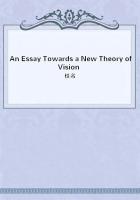SOCRATES: But, friend Euthyphro, if that which is holy is the same with that which is dear to God, and is loved because it is holy, then that which is dear to God would have been loved as being dear to God; but if that which is dear to God is dear to him because loved by him, then that which is holy would have been holy because loved by him. But now you see that the reverse is the case, and that they are quite different from one another. For one (theophiles) is of a kind to be loved cause it is loved, and the other (osion) is loved because it is of a kind to be loved. Thus you appear to me, Euthyphro, when I ask you what is the essence of holiness, to offer an attribute only, and not the essence--the attribute of being loved by all the gods. But you still refuse to explain to me the nature of holiness. And therefore, if you please, I will ask you not to hide your treasure, but to tell me once more what holiness or piety really is, whether dear to the gods or not (for that is a matter about which we will not quarrel); and what is impiety?
EUTHYPHRO: I really do not know, Socrates, how to express what I mean.
For somehow or other our arguments, on whatever ground we rest them, seem to turn round and walk away from us.
SOCRATES: Your words, Euthyphro, are like the handiwork of my ancestor Daedalus; and if I were the sayer or propounder of them, you might say that my arguments walk away and will not remain fixed where they are placed because I am a descendant of his. But now, since these notions are your own, you must find some other gibe, for they certainly, as you yourself allow, show an inclination to be on the move.
EUTHYPHRO: Nay, Socrates, I shall still say that you are the Daedalus who sets arguments in motion; not I, certainly, but you make them move or go round, for they would never have stirred, as far as I am concerned.
SOCRATES: Then I must be a greater than Daedalus: for whereas he only made his own inventions to move, I move those of other people as well. And the beauty of it is, that I would rather not. For I would give the wisdom of Daedalus, and the wealth of Tantalus, to be able to detain them and keep them fixed. But enough of this. As I perceive that you are lazy, I will myself endeavour to show you how you might instruct me in the nature of piety; and I hope that you will not grudge your labour. Tell me, then--Is not that which is pious necessarily just?
EUTHYPHRO: Yes.
SOCRATES: And is, then, all which is just pious? or, is that which is pious all just, but that which is just, only in part and not all, pious?
EUTHYPHRO: I do not understand you, Socrates.
SOCRATES: And yet I know that you are as much wiser than I am, as you are younger. But, as I was saying, revered friend, the abundance of your wisdom makes you lazy. Please to exert yourself, for there is no real difficulty in understanding me. What I mean I may explain by an illustration of what I do not mean. The poet (Stasinus) sings--'Of Zeus, the author and creator of all these things, You will not tell: for where there is fear there is also reverence.'
Now I disagree with this poet. Shall I tell you in what respect?
EUTHYPHRO: By all means.
SOCRATES: I should not say that where there is fear there is also reverence; for I am sure that many persons fear poverty and disease, and the like evils, but I do not perceive that they reverence the objects of their fear.
EUTHYPHRO: Very true.
SOCRATES: But where reverence is, there is fear; for he who has a feeling of reverence and shame about the commission of any action, fears and is afraid of an ill reputation.
EUTHYPHRO: No doubt.
SOCRATES: Then we are wrong in saying that where there is fear there is also reverence; and we should say, where there is reverence there is also fear. But there is not always reverence where there is fear; for fear is a more extended notion, and reverence is a part of fear, just as the odd is a part of number, and number is a more extended notion than the odd. Isuppose that you follow me now?
EUTHYPHRO: Quite well.
SOCRATES: That was the sort of question which I meant to raise when Iasked whether the just is always the pious, or the pious always the just;and whether there may not be justice where there is not piety; for justice is the more extended notion of which piety is only a part. Do you dissent?
EUTHYPHRO: No, I think that you are quite right.
SOCRATES: Then, if piety is a part of justice, I suppose that we should enquire what part? If you had pursued the enquiry in the previous cases;for instance, if you had asked me what is an even number, and what part of number the even is, I should have had no difficulty in replying, a number which represents a figure having two equal sides. Do you not agree?
EUTHYPHRO: Yes, I quite agree.
SOCRATES: In like manner, I want you to tell me what part of justice is piety or holiness, that I may be able to tell Meletus not to do me injustice, or indict me for impiety, as I am now adequately instructed by you in the nature of piety or holiness, and their opposites.
EUTHYPHRO: Piety or holiness, Socrates, appears to me to be that part of justice which attends to the gods, as there is the other part of justice which attends to men.
SOCRATES: That is good, Euthyphro; yet still there is a little point about which I should like to have further information, What is the meaning of 'attention'? For attention can hardly be used in the same sense when applied to the gods as when applied to other things. For instance, horses are said to require attention, and not every person is able to attend to them, but only a person skilled in horsemanship. Is it not so?
EUTHYPHRO: Certainly.
SOCRATES: I should suppose that the art of horsemanship is the art of attending to horses?
EUTHYPHRO: Yes.
SOCRATES: Nor is every one qualified to attend to dogs, but only the huntsman?
EUTHYPHRO: True.
SOCRATES: And I should also conceive that the art of the huntsman is the art of attending to dogs?
EUTHYPHRO: Yes.
SOCRATES: As the art of the oxherd is the art of attending to oxen?
EUTHYPHRO: Very true.















